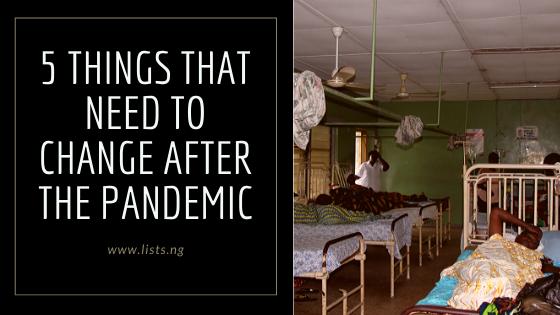The world is changing drastically, and more changes will follow even after the pandemic is defeated. For Nigeria, these changes are important both as individuals and as a nation. The pandemic has exposed underlying problems in Nigeria like poor healthcare system and insecurity, and has also us given the opportunity to improve or change.
Healthcare systems
The world last experienced a pandemic of this magnitude 100 years ago and since then technology and science have brought about advancement in medicine and healthcare. But even with all the advancement, nothing could have prepared us for what has befell us. Even countries with the most advanced healthcare systems have been incredibly ravaged to an extent that no one knows what to do. In Nigeria where healthcare has been ignored and wealthy public office holders are quick to fly overseas for the slightest discomfort rather than fix the problems at home, reality now has just begun to dawn on us.The neglect over the years has started to bite us on our behinds, and everyone, including the masses and government officials is feeling the heat. Fortunately, we are yet to experience the full extent of the virus, but if we do, we can only just pray. Testing has now been ramped up and more cases are being discovered every day, and if you are hearing about Nigeria for the first time and you’re wondering if we have the capacity to handle a full blown outbreak, the answer is NO! The virus has already taken away the Chief of Staff of the President, who surely under different circumstances would have been immediately flown abroad for treatment. In a rational world, this should serve as a wake up call for governments to solve the inherent and overlapping problems with the Nigerian healthcare systems, but if history has taught us anything, there are better things to do with your time than raising your hopes up.
Government accountability
The pandemic has opened our eyes to several underlying problems which the government has continuously denied. The unfortunate rate of poverty and insecurity has been made glaring by the lockdown in Lagos and Ogun. Cries of hunger have resonated all over and street urchins have taken advantage of the opportunity to wreak havoc. While the Nigerian government can no longer deny hunger, their attempt to solve the problem has been nothing short of dismal. People have been moved to protect themselves with machetes and sticks as the security systems have failed them. There have been several reports of donations, mostly monetary, which are supposed to aid purchase of equipment and help the government provide palliatives. However, the trend nowadays is to release sham figures that are supposed to represent the amount spent on alleviating hunger and poverty. Maybe all these would create a new dispensation in Nigerian where government officials will start to answer pertinent questions or be voted out and the most qualified people voted in, maybe.
Money
For a while now the Central Bank of Nigeria has pushed for the implementation of the cashless policy in the country.To an extent this has gained success, especially among the younger generation. However, the majority of people are yet to get along with the plan as they prefer to see cash before any business transactions can be carried out. Well, cash notoriously carries bacteria and viruses, hence, coronavirus can be spread through it. Stores in several countries have as a matter of fact started rejecting cash and are accepting only digital payments. This is poised to be the trend for now, as well as when the pandemic is defeated. Digital banking platforms are set to take centre stage and doubters will have no other choice but to trust it.
How we study
Technology has never been as important as it is at the moment, it keeps us informed and entertained, makes remote working run smoothly and now it’s helping us study. Online courses have been in existence for some time now, but the pandemic has really brought it to the fore. Harvard University has put out an array of free online courses, even Lagos state government has provided classes across subjects across all secondary school classes on television and radio, and most recently have approved online classes for all state owned institutions. This should definitely be a one time thing as it will be beneficial for those who ordinarily cannot always make classes, and more so reduce the expenses of going to a physical university.
How we work
Before the pandemic several business owners and CEOs would cringe at the idea of working from home, with their foundations planted firmly on the traditional ways of working. Coronavirus has however changed everything and flexibility has become necessary. Organisations and teams are figuring out how to collaborate at a distance with technology, and leaders are learning new ways to oversee and manage their team members. After the pandemic, there is sure to be a transformation as companies will begin to provide more choice and flexibility to employees to work from wherever as long as there is productivity.






